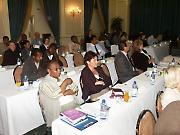Seminar
Details
“The State of political culture in the New South Africa”
Opening Address by the Acting Resident Representative of Konrad-Adenauer-Stiftung, Ms Andrea E Ostheimer
Dear Ladies and Gentlemen,
It is an honour and pleasure for me to welcome you today to the joint conference of St. Augustine College and the Konrad-Adenauer-Stiftung.
Particularly I would like to extend a warm welcome to the representatives of political parties,
The Minister for Science and Technology, Mr. Mosibudi Mangena, President of AZAPO
His Excellency Prince Mangosuthu Buthelezi, President of Inkatha Freedom Party
The Deputy President of the African Christian Democratic Party, Ms Joann Downs
Dr. Pieter Mulder, President of Freedom Front Plus
Mr. Isaac Mfundisi, President of the UCDP
Mr. Tinyika Manyisa, Councillor for the Independent Democrats at the Ekurhuleni Metropolitan Council
And Mr John Moodey, Chief Spokesperson for the DA on Community Saftey, Public Works and Transport
A special word of welcome also goes to all Honourable Members of Parliament and Members of the Diplomatic Corps, our colleagues from St. Augustine College and other KAS partner organizations.
Ladies and Gentlemen,
On our invitation we have cited the American political scientists which more than anyone else have coined the term political culture. According to Gabriel Almond and Sidney Verba, “Political culture is the pattern of individual attitudes and orientations towards politics among the members of a political system.”
Although this phrase captures shortly what political culture is, it falls short in the differentiation necessary between the political culture existing on elite level and the one existing amongst the citizens of a given system.
The new South Africa inherited a complex political culture that has been shaped by the culture of liberation movements as well as by the culture of the apartheid system. When one discusses nowadays corruption issues it sometimes appears to be discussed as a recent phenomena but one should not forget the patronage politics that have played a large part in the development of Afrikaner Nationalism. In the pre-1994 era Bantustans existed on an irrational economic and politically illegitimate bases and therefore had to be built largely on the basis of subsidies and rent of every kind.
On the other hand, the ANC brought along the culture of a liberation movement. The war situation the ANC was in led to a need-to-know culture in which trust and loyality were printed above other qualities. Such loyality networks can easily transmute into networks of patronage. Along in this context comes also the dichotomic perception of “we and they” and the conviction that if you are not with the liberator, you are considered to against it.
A culture certainly necessary in order to survive in a hostile environment but definitely not conducive in order to enhance mutual tolerance, to compromise and to have long lasting coalitions.
However, to look at South Africa’s political culture means not only to look at the culture existing within and amongst political parties, it also means scrutinizing public policy and decision-making. One crucial question that needs to be asked is definitely to what extent Black Economic Empowerment facilitates Nepotism and Patronage and how to have the right measure in place in order to prevent that.
A democratic political culture starts with the individual and particularly with the political leaders. As political scientist Tom Lodge has pointed out: the quality of leadership matters more in new democracies than in established political systems where democracies are young institutions still fluid and more susceptible to be shaped by dominant personalities.
However, how ethic is the behaviour of South African politicians? What kind of oversight do they provide? The list of scandals emerging since 1994 has become elaborate and bears the names of the who is who of South Africa’s liberation struggle.
Nevertheless equally pertinent in this context is to ask the question what kind of peer review mechanisms exist or can there be noted a level of tolerance and acquiescence in certain modes of behaviour?
Looking at the political culture in today’s South Africa also means to leave the elite level and to see what kind of impact it does have on citizens. The survival of any political system depends on the support of the political elite and the population. There has to be an agreement between elites and the broader society that a democratic system is the best, albeit imperfect, form of government.




